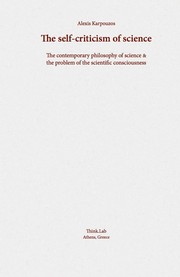Buy this book

The contemporary philosophy of science (epistemology) featuring K.Popper, T.Kuhn, I.Lakatos, P.Feyerabend, Hanson among others, has exercised a decisive critique to the dominant views of the positivist and neo-positivist model of knowledge and has in fact undermined its credibility.
Buy this book

Subjects
quantum physics, physics, cosmology, philosophy, spirituality, meditation, consciousness, social sciences, mathematics, brain, metaphysicsPeople
alexis karpouzosShowing 1 featured edition. View all 1 editions?
| Edition | Availability |
|---|---|
| 1 |
aaaa
|
Book Details
Table of Contents
Edition Notes
Contributors
ID Numbers
Work Description
The neoteric human being is now being cut off from the order of nature and establishes itself as the rationally reflecting and acting subject which is now posited against the object of its cognitive and practical activity. Civilization is constituted as the product of human activity, as an artifact and technical construct. With this development, human civilization is transformed to a ‘quasi nature’, aiming to correct and replace nature, and man assumes the nature of a technical existence. By ‘technical existence’ we mean the prevalence of a one-dimensional image of the human person as the producer of rational hypotheses and interpretations and the downgrading and degradation of the non-rational element of human existence, i.e. the radical imagination as a creative capacity, which forms the a priori condition and prerequisite for social activity. This constitutive element of the modern world (man, as the producer of rational hypotheses) and its articulation with the ideology of techno-scientific progress and the evolution of the machine that transforms the methods and theories of natural sciences, arming these with new tools and constantly renovating their research and experimental capabilities, finally led to the replacement of religious and metaphysical dogmas by the blind faith to the dogma of technical and scientific progress.
Community Reviews (0)
Feedback?| April 16, 2020 | Edited by alexis karpouzos | Edited without comment. |
| April 3, 2015 | Created by alexis karpouzos | Added new book. |










